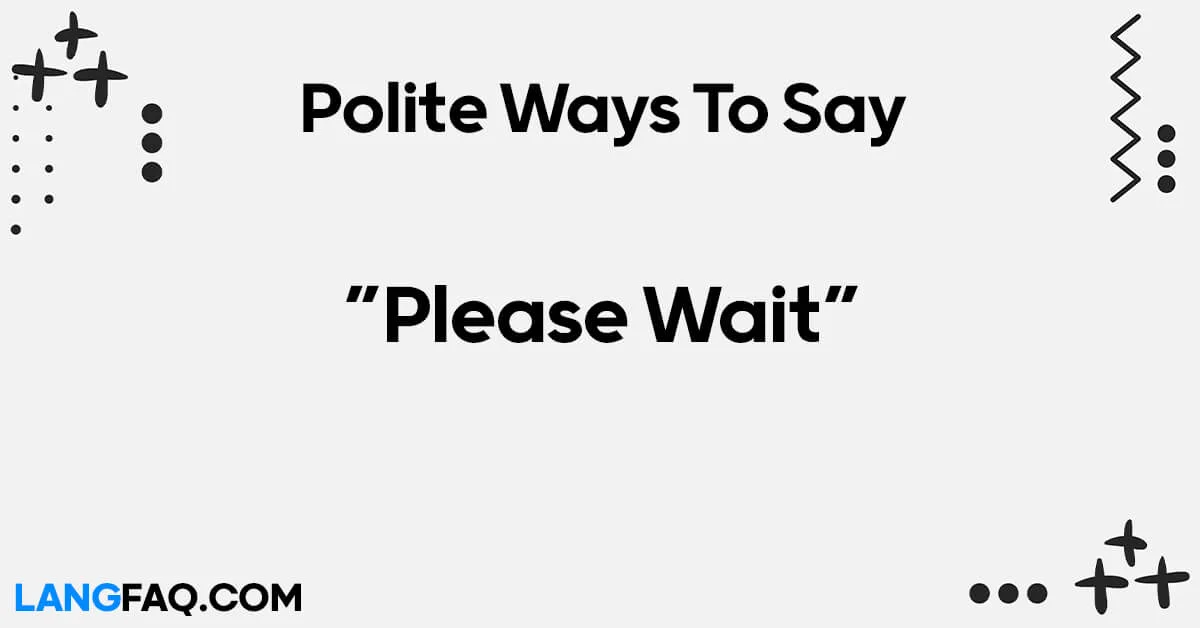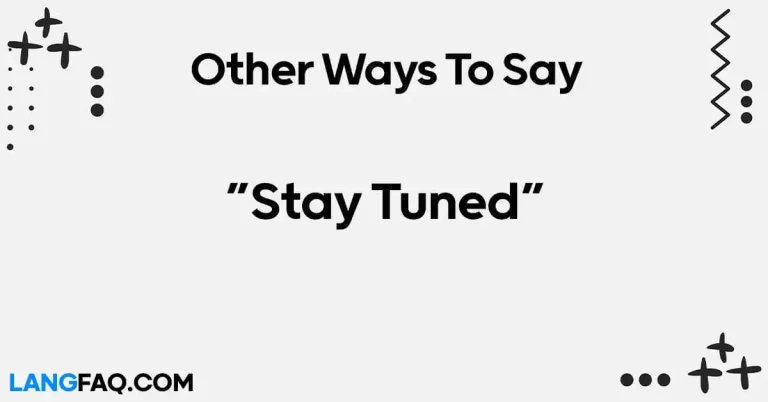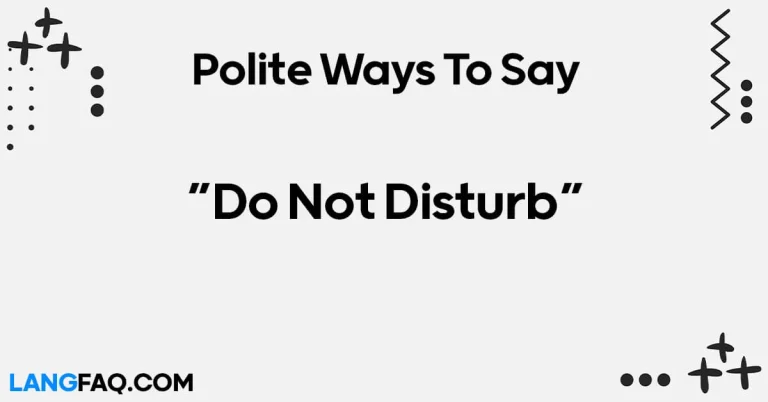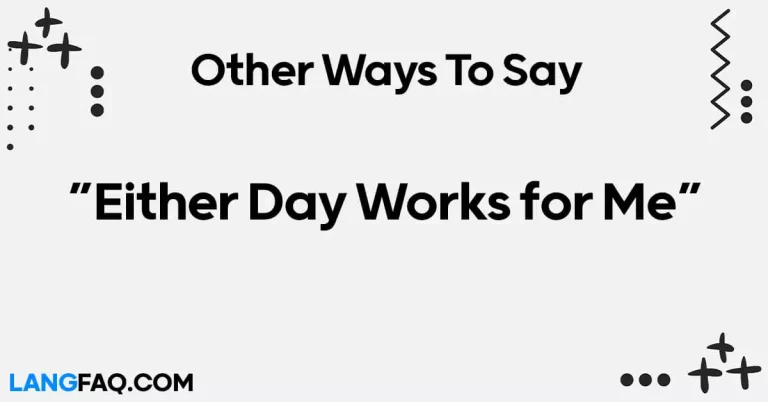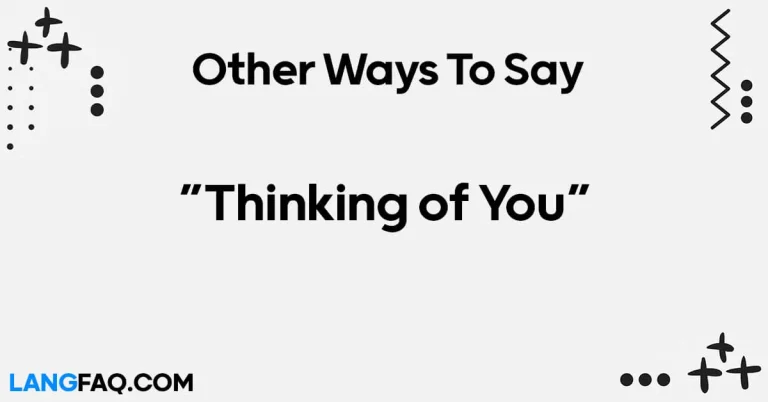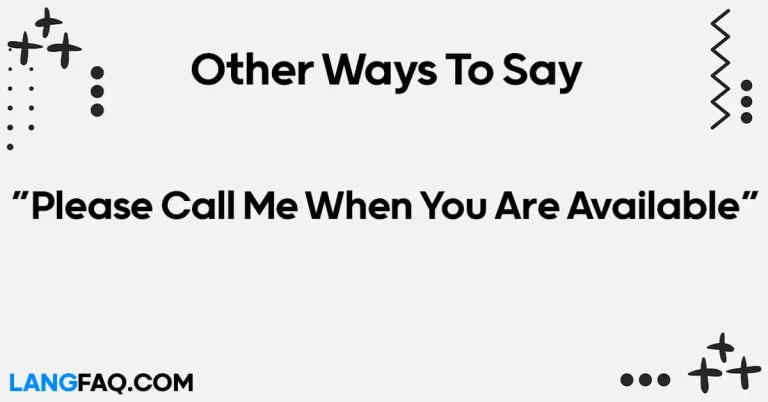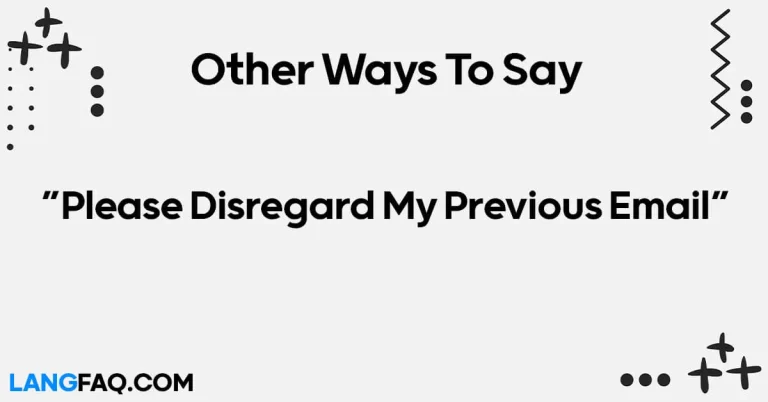In a fast-paced world, patience becomes a virtue, and how we express the need to wait matters. This comprehensive guide explores 12 polite ways to say “Please Wait,” offering insights, alternatives, and a touch of finesse for more courteous communication.
12 Polite Ways to Say “Please Wait”
Here are 12 polite ways to say “Please Wait”:
- A Moment, Please
- Your Patience is Appreciated
- Just a Brief Pause
- Allow Me a Moment
- May I Keep You for a Short While?
- In a Moment, Please Join Me
- I’ll Be Right with You
- Just a Quick Intermission
- Kindly Bear with Me
- Your Wait Won’t Be in Vain
- A Brief Hold, Please
- Just a Momentary Delay
Here’s a table with the meaning and examples of the 12 polite ways to say “Please Wait”:
| Polite Expression | Meaning | Example Sentence |
|---|---|---|
| A Moment, Please | Requesting a brief pause | “Could you wait a moment while I fetch the documents?” |
| Your Patience is Appreciated | Expressing gratitude for waiting | “Thank you for your patience; we’ll be right with you.” |
| Just a Brief Pause | Indicating a short waiting period | “I appreciate your time; it’ll just be a brief pause.” |
| Allow Me a Moment | Requesting time for a personal task | “Would you mind allowing me a moment to check?” |
| May I Keep You for a Short While? | Politely inviting someone to wait briefly | “May I keep you for a short while as I finish up?” |
| In a Moment, Please Join Me | Inviting someone to join after a pause | “In a moment, please join me for a quick discussion.” |
| I’ll Be Right with You | Assuring prompt attention | “Please wait; I’ll be right with you to assist.” |
| Just a Quick Intermission | Adding a lighthearted tone to the wait | “Let’s take just a quick intermission before we proceed.” |
| Kindly Bear with Me | Humbly asking for patience | “I’m dealing with a small issue; kindly bear with me.” |
| Your Wait Won’t Be in Vain | Promising a valuable outcome | “Rest assured, your wait won’t be in vain; it’s worth it.” |
| A Brief Hold, Please | Requesting a temporary hold | “Could you please hold for a brief moment?” |
| Just a Momentary Delay | Minimizing the significance of the wait | “I apologize for the just momentary delay in service.” |
Mastering the art of polite communication during moments of waiting is crucial for maintaining positive interactions. The table provides a diverse set of expressions, each tailored to convey the need for a pause or delay with courtesy and respect. Whether you’re assuring prompt attention, expressing gratitude, or inviting someone to join after a brief wait, these phrases offer a versatile toolkit for navigating delays with finesse. Incorporating these polite ways to say “Please Wait” into your communication repertoire can enhance your ability to convey messages graciously in a variety of situations.
Is It Correct to Say “Please Wait”?
Certainly, “Please wait” is a correct and widely used phrase. It is a polite and straightforward way to request someone’s patience or ask them to remain in a particular position for a brief period. This phrase is commonly employed in various contexts, including:
- Customer Service: In situations where assistance is required, customer service representatives often use “Please wait” to inform individuals that they are being attended to.
- Business Meetings: During meetings or presentations, organizers might use this phrase when there’s a need for a momentary pause or technical adjustments.
- Public Transportation: Announcements in public transport often include “Please wait” to indicate that passengers should remain until the vehicle comes to a complete stop.
- Web Applications: In online settings, such as websites or applications, you might encounter “Please wait” messages when data is being processed or loaded.
While “Please wait” is correct and widely accepted, the previous response provided alternative and more nuanced expressions to add variety and politeness to your communication. Depending on the situation and your desire to convey a particular tone, you can choose from the array of phrases discussed earlier to make your communication more engaging and courteous.
Professional Mail Example With “Please Wait”
Subject: Brief Pause for Technical Adjustment – Please Wait
Dear [Recipient’s Name],
I trust this email finds you well. I am writing to inform you that we are currently in the process of making some necessary technical adjustments to our systems to enhance your user experience.
During this brief pause, please be assured that your satisfaction is our top priority. We kindly ask for your patience and understanding as we work to implement these improvements promptly.
We anticipate that the adjustments will be completed within the next hour. In the meantime, should you have any urgent concerns or require immediate assistance, please feel free to contact our customer support at [Customer Support Email/Phone].
We appreciate your understanding and cooperation in ensuring the continued efficiency of our services.
Thank you for choosing [Your Company Name].
Best regards,
[Your Full Name] [Your Position] [Your Company Name] [Your Contact Information]
Polite Mail Example With “Please Wait”
Subject: Your Inquiry – A Moment, Please
Dear [Recipient’s Name],
I hope this message finds you well. Thank you for reaching out to us with your inquiry.
I wanted to personally acknowledge your request and assure you that your message is important to us. Please allow us a moment to thoroughly review the details and provide you with the most accurate and helpful response.
Your patience during this brief pause is highly appreciated. We understand that your time is valuable, and we want to ensure that we address your concerns with the attention they deserve.
Rest assured, we are working diligently to get back to you as soon as possible. In the meantime, if you have any additional information or specifics to share, please feel free to respond to this email.
Once again, thank you for choosing [Your Company Name]. We value your trust, and we are committed to delivering the best service possible.
A member of our team will be in touch shortly. If you have any urgent matters, please do not hesitate to contact us directly at [Your Contact Information].
Thank you for your understanding.
Best regards,
[Your Full Name] [Your Position] [Your Company Name] [Your Contact Information]
A Moment, Please
In the realm of courteous communication, “A Moment, Please” stands as a beacon of elegance and consideration. This phrase delicately requests a brief pause, acknowledging the value of the other person’s time without causing undue inconvenience.
When to Use:
This phrase is versatile and suitable for both formal and informal contexts. It is appropriate in professional settings, during casual conversations, or when seeking a momentary break from a task.
Example Sentence:
In a formal email:
“Dear [Recipient’s Name],
I hope this message finds you well. A moment, please, as I gather the necessary information to address your inquiry promptly. Your patience is highly appreciated.
Best regards, [Your Name]”
In a casual conversation: “Hey, do you have a moment, please? I wanted to discuss something with you real quick.”
Variations:
- “A Quick Moment, Please” (slightly more informal)
- “Just One Moment, Please” (formal and concise)
Your Patience is Appreciated
Expressing gratitude is an art, and “Your Patience is Appreciated” masterfully accomplishes this while assuring the individual that their wait is valued.
When to Use:
This expression is perfect for formal situations, especially in professional emails, customer service interactions, or when addressing a larger audience.
Example Sentence:
In a customer service email:
“Dear Customer,
Thank you for reaching out to us. Your patience is highly appreciated as our team is diligently working to resolve your issue. We assure you of our commitment to providing a swift solution.
Sincerely, [Customer Support Team]”
In a presentation: “As we navigate through these updates, your patience is appreciated. We understand your time is valuable, and we aim to make this brief and informative.”
Variations:
- “I Appreciate Your Patience” (more direct)
- “Thank You for Waiting” (casual and friendly)
Just a Brief Pause
Sometimes, brevity is the key to effective communication, and “Just a Brief Pause” encapsulates this notion seamlessly. It communicates a short waiting period without causing disruption.
When to Use:
This phrase is suitable for various settings, both professional and informal. It works well in situations where a quick break is needed without making the delay seem significant.
Example Sentence:
In a team meeting: “Team, before we proceed, just a brief pause to ensure everyone is on the same page. We’ll resume in a minute.”
In a casual conversation: “Sorry, just a brief pause—I need to grab my coffee. I’ll be right back!”
Variations:
- “Just a Quick Break” (more informal)
- “Taking a Momentary Pause” (slightly formal)
Allow Me a Moment
“Allow Me a Moment” delicately requests time for a personal task, balancing politeness and the speaker’s need for a brief pause. This phrase is particularly effective in scenarios where the individual needs a short break without causing inconvenience.
When to Use:
Use this phrase in professional settings to request a momentary pause during a meeting, presentation, or discussion. It’s also suitable for informal situations where a brief interruption is necessary.
Example Sentence:
In a business meeting: “Thank you for your insights, everyone. Allow me a moment to review the data before we proceed with the next agenda item.”
In a casual context: “Sure, I can help with that. Allow me a moment to gather the necessary information.”
Variations:
- “May I Have a Moment?” (more direct)
- “Can I Take a Quick Break?” (informal)
May I Keep You for a Short While?
Transforming waiting into an agreeable interaction, “May I Keep You for a Short While?” is a polite and inviting way to request someone’s time briefly.
When to Use:
This phrase is ideal in situations where the speaker needs someone’s attention for a short but valuable interaction, whether in a formal or casual context.
Example Sentence:
In a formal presentation: “Before we conclude, may I keep you for a short while to address any questions or concerns you may have?”
In a casual conversation: “Hey, if you don’t mind, may I keep you for a short while to discuss this exciting project?”
Variations:
- “Can I Borrow You for a Moment?” (informal)
- “May I Take a Few Minutes of Your Time?” (slightly more formal)
In a Moment, Please Join Me
Combining courtesy with inclusivity, “In a Moment, Please Join Me” not only requests patience but also hints at an upcoming shared experience.
When to Use:
This phrase is effective in professional settings, especially when transitioning from a waiting period to an engaging activity or discussion.
Example Sentence:
In a team collaboration: “We’ve been patiently waiting for this moment. In a moment, please join me as we unveil the exciting updates and future plans.”
In a casual setting: “We’re about to start the movie. In a moment, please join me on the couch for a cinematic experience.”
Variations:
- “Join Me in a Moment” (casual)
- “In a Moment, Let’s Move Forward Together” (formal)
I’ll Be Right with You
Assuring prompt attention, “I’ll Be Right with You” is a classic and straightforward phrase that instills confidence in the listener, making the wait more bearable.
When to Use:
This phrase is universally applicable and works well in professional settings, customer service interactions, or casual conversations where promptness is essential.
Example Sentence:
In a business call: “Thank you for holding. I’ll be right with you to discuss the details of your inquiry.”
In a casual encounter: “Just finishing up a task, I’ll be right with you to help with that.”
Variations:
- “I’ll Be with You Shortly” (formal)
- “Be Right Back with You” (casual)
Just a Quick Intermission
Adding a touch of drama to the request for waiting, “Just a Quick Intermission” injects positivity into the brief pause, making the waiting period more engaging.
When to Use:
This phrase is suitable for informal contexts, team meetings, or situations where a break in the proceedings can be presented as a positive and necessary interlude.
Example Sentence:
In a team presentation: “Before we delve into the next section, let’s take just a quick intermission to refresh and refocus.”
In a casual chat: “We’re in the middle of a brainstorming session. Just a quick intermission for some snacks, and we’ll be back.”
Variations:
- “A Short Break in the Action” (formal)
- “Let’s Pause for a Quick Break” (casual)
Kindly Bear with Me
Expressing vulnerability to foster understanding, “Kindly Bear with Me” humbly requests patience, creating a connection between the speaker and the listener.
When to Use:
This phrase is well-suited for professional contexts, especially when the speaker needs understanding and patience during a challenging or complex task.
Example Sentence:
In a project update email: “As we navigate through unexpected challenges, kindly bear with me. Your support is invaluable in overcoming these hurdles.”
In a team discussion: “Implementing these changes may take some time. Kindly bear with me as we work towards a more efficient process.”
Variations:
- “Please Be Patient with Me” (direct)
- “Your Understanding is Much Appreciated” (formal)
Your Wait Won’t Be in Vain
Instilling optimism with the promise of a valuable outcome, “Your Wait Won’t Be in Vain” transforms a delay into an opportunity, fostering positivity.
When to Use:
This phrase is effective in professional contexts, customer service interactions, or situations where the speaker wants to assure the listener that the waiting will lead to a worthwhile result.
Example Sentence:
In a product launch announcement: “We appreciate your anticipation. Rest assured, your wait won’t be in vain. Our upcoming release is packed with innovative features.”
In a project update: “The team has been working diligently, and your wait won’t be in vain. Exciting developments are on the horizon.”
Variations:
- “Your Patience Will Be Rewarded” (formal)
- “Great Things Await Your Wait” (optimistic)
A Brief Hold, Please
Navigating delays gracefully, “A Brief Hold, Please” is a concise yet polite request, minimizing disruption while ensuring cooperation.
When to Use:
This phrase is suitable for formal settings, such as business calls, presentations, or any situation where a brief pause is needed without causing inconvenience.
Example Sentence:
In a conference call: “Before we proceed to the next agenda item, a brief hold, please. We’ll resume shortly.”
In a training session: “Your engagement has been fantastic. Just a brief hold, please, as we prepare for the interactive segment.”
Variations:
- “Hold for a Moment, Please” (formal)
- “Just a Momentary Pause” (slightly more casual)
Just a Momentary Delay
Wrapping up our exploration, “Just a Momentary Delay” downplays the inconvenience, making the wait seem insignificant.
When to Use:
This phrase is versatile and can be employed in both formal and informal settings, signaling a minor delay without causing undue concern.
Example Sentence:
In a project update email: “We’re experiencing just a momentary delay in the implementation schedule. Thank you for your understanding as we address this promptly.”
In a team discussion: “Apologies for the just momentary delay. Let’s refocus and continue with the task at hand.”
Variations:
- “A Minor Setback, Just Momentary” (formal)
- “Don’t Worry, It’s Brief” (casual)
Incorporating these diverse and polite ways to express the need to wait into your communication toolkit will undoubtedly enhance your ability to navigate delays with finesse and maintain a positive atmosphere in various contexts.
FAQs
How do I politely ask someone to wait?
To politely ask someone to wait, you can use phrases like “A Moment, Please,” “Just a Brief Pause,” or “I’ll Be Right with You.” Expressing gratitude, acknowledging their patience, or inviting them to join you can also add a polite touch.
Are these phrases suitable for both formal and informal settings?
Yes, these phrases are versatile and can be used in various settings, both formal and informal. Choose the one that best fits the context of your communication.
Can I use these phrases in professional emails?
Certainly! Politeness is appreciated in professional communication. You can incorporate these phrases in emails to convey the need for a brief pause or delay professionally.
How can I make waiting more bearable for others?
Assure them that their wait is valued, provide a timeframe if possible, and express gratitude. Creating a positive and inclusive atmosphere can make waiting more bearable.
Is it essential to explain the reason for the delay?
While not always necessary, providing a brief explanation can enhance understanding. However, keep it concise to maintain a positive tone.
Can I use these phrases in customer service interactions?
Absolutely! Politeness is key in customer service. These phrases can be adapted to reassure customers and maintain a positive customer experience.
Conclusion
Mastering the art of polite communication during wait times is essential in today’s fast-paced world. By incorporating these 12 polite ways to say “Please Wait” into your repertoire, you can navigate delays with finesse, maintaining respect and positivity.

